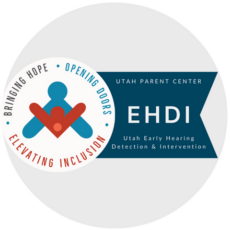
Programs for Infants Who Are Deaf or Hard of Hearing
Communication and language development starts at birth – long before a child’s first words. Upon diagnosis of any type of hearing loss, or hearing difference, the child should be enrolled in early intervention or EI services. For infants, this should occur as soon as possible, but before 6 months of age.
The role of EI services is to enhance early growth and development for infants and toddlers with developmental delays or disabilities, by providing individualized support and services to the child and their family. For children who are deaf or hard of hearing (DHH), specialized services are provided by the Utah Schools for the Deaf and the Blind Parent Infant Program (PIP), or Sound Beginnings (SB) program at Utah State University.
Where can I go to get more information about PIP, EI and SB?
- Baby Watch Early Intervention Program (Part C services federal grantee) familyhealth.utah.gov/oec/baby-watch-early-intervention/
- Parent Infant Program (Part C service provider) usdb.org/programs/deaf-and-hard-of-hearing/parent-infant-program-pip-for-deaf-a nd-hard-of-hearing-children/
- Sound Beginnings at Utah State University (Private early intervention services specific to listening and spoken language/LSL) cehs.usu.edu/sound-beginnings/
Where are PIP, EI and SB services provided?
Services are provided in the child’s natural environment – at home. Service providers will come to you.
- Why do they meet me at my home? Shouldn’t I be attending a clinic to help my child?
Children learn best when they are in a safe, comfortable environment with someone they trust and love. Your home and community are great places for learning! The relationship you have with your child opens doors for development! PIP teaches strategies that you can apply to your established routines, so they feel natural and achievable.
Which local EI program am I going to work with?
The local EI programs are assigned based on the area in which you live in the state. You can find your local program at Baby Watch Early Intervention Program. USDB PIP provides services statewide. Sound Beginnings provides services to families within the Cache, Rich and Box Elder counties.
How long will my child receive PIP, EI and or SB services?
Your child may be eligible for early intervention services until their 3rd birthday.
What happens after my child turns 3?
The local school district is responsible for providing special education services for children age 3 and older, although there are other options that are available. Your local EI program will prepare your child and family for school- or community-based services in the months prior to your child’s 3rd birthday. Sound Beginnings offers a Preschool-program.
What if I don’t want to receive PIP or Early Intervention services?
Participation is 100% voluntary. You can discontinue services at any time. Keep in mind that it’s easier to prevent delays than to try and address them later.
How much does PIP, SB and Early Intervention (EI) cost?
PIP and SB services are FREE. EI services are free if any family member is enrolled in Medicaid, CHIP, WIC Early Head Start, or TANF. For families not enrolled in these programs there is a flat monthly family fee for EI services (e.g., speech, occupational, or physical therapy). All EI evaluations, assessments, and service coordination are free.
How much is the monthly family fee for EI services?
The monthly family fee is based on family size and income. The Sliding Scale that determines your family fee is available at Baby Watch Early Intervention Program.
Will PIP, SB or Early Intervention bill my insurance?
No. PIP and SB do not bill private insurance as all their services are free. Early Intervention does not accept private insurance. Early Intervention will bill Medicaid or CHIP for your child’s early intervention services if your child is currently enrolled in a public insurance program.






